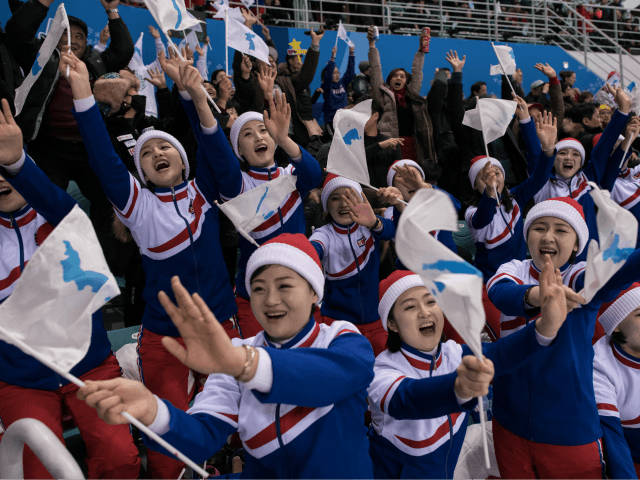The South Korean government is debating a proposal to bill South Korean taxpayers almost $3 million to cover the cost of North Korea’s participation in the 2018 Winter Olympics.
Many South Koreans are deeply skeptical of North Korea’s appearance at the Games and unhappy with their government’s decision to finance what they see as Pyongyang propaganda.
Yonhap News reports that the South and North Exchange and Cooperation Council will meet on Wednesday to debate a motion to cover Pyongyang’s Olympic bills. If approved, the motion would use 2.9 billion won (roughly $2.7 million in U.S. dollars) from the Council’s budget to pay for the hundreds of North Koreans who participated in the Pyeongchang Olympics.
Another meeting will be held in March to determine if South Korea will cover the cost of North Korea’s participation in the Paralympics as well.
Yonhap notes the funding arrangements are “part of the two Koreas’ previous agreement that requires the South to provide convenience for the North Korean delegation to the Games.”
South Korean taxpayers might grumble about paying the bills for a rogue nation that constantly threatens them with annihilation, and the ruling class lives in decadent luxury with plenty of money to burn on illegal nuclear weapons research while the population starves to the brink of cannibalism. Somehow North Korea was able to scrape up enough money for a big pre-Olympic military parade packed with shiny new ballistic missiles.
It is doubly galling when North Korea used the Olympics to launch a “charm offensive” that appears to have enchanted much of the American media class and might just give North Korea the diplomatic cover it needed to cross the nuclear missile finish line.
Factor in South Korea’s stupendous financial losses for hosting the Olympics and the dosage of gall may double again. According to an analysis provided to CNBC by economics professor Andrew Zimbalist of Smith College, lukewarm ticket sales of only 60 percent mean the city of Pyeongchang stands to lose over ten billion dollars on the Olympics, and the residual value of infrastructure created for the Games is highly unlikely to defray much of the loss over time.
“Unless there are a lot of people who are going to be going back and forth between the two areas, the infrastructural investments don’t make sense, most of—almost all of—the infrastructural venues and the sport venue investments don’t make sense,” Zimbalist noted, pointing out Pyeongchang’s inconvenient distance from Seoul and the long history of Olympic villages failing to reap the promised benefits from infrastructure improvements.
For added buzzkill, Zimbalist recalled that joint North-South Korean Olympic teams were formed on three previous occasions, and did absolutely nothing to improve relations on the peninsula or slow Pyongyang’s relentless march to nuclear power status.
The generation gap in South Korean politics may play a factor as well since younger citizens—who were supposed to be most interested in liberalizing relations between North and South Korea and most enthusiastically supportive of President Moon Jae-in’s dovish stance—have in fact proven deeply skeptical of the North Korean “charm offensive.”
The American media almost universally insist that North Korea’s Olympic performance was dazzling and easily “stole the spotlight” from visiting American Vice President Mike Pence, but there is very little evidence of that in South Korea.
“People are very skeptical about the North’s charm offensive, as well as the South Korean government’s attempt to continue dialogue,” former Korea Institute for National Unification president Kim Tae-woo told the Financial Times on Tuesday.
South Koreans young and old expressed that skepticism to the FT, from a 35-year-old researcher who vowed to remain hostile to North Korea “as long as its weapons are directed at us” to a 64-year-old businessman who dismissed the charm offensive as “political propaganda.” Young South Koreans are said to have largely concluded that reunification with the hideous regime to the north would be “uncool.”
Those skeptical South Koreans are not happy to know their tax dollars funded North Korea’s propaganda push. Referring specifically to Seoul’s financial support for Pyongyang’s participation in the Games, Kim Chul-woo of the Korea Institute for Defense Analyses said, “Young South Koreans are not impressed with North Korea coming to the Olympics with their forks and spoons in hand.”

COMMENTS
Please let us know if you're having issues with commenting.